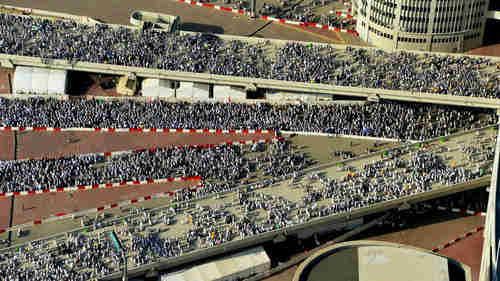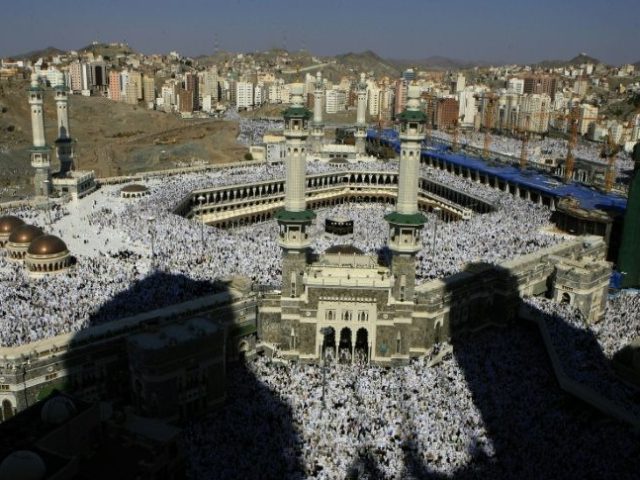This morning’s key headlines from GenerationalDynamics.com
- A disastrous year in relations between Iran and Saudi Arabia
- Iran bans Iranians from attending the Hajj in 2016
- Far left anti-government riots spread across France
A disastrous year in relations between Iran and Saudi Arabia

View of the streets of Mina where the stampede occurred during the Hajj in 2015 (AP)
Sectarian Sunni versus Shia relations in the Mideast have worsened significantly in the last year, largely driven by Iran’s support of the Syria’s genocidal Alawite president Bashar al-Assad, who for five years has been conducting a war of extermination against his own Sunni citizens.
The Hajj takes place each year in Mecca, in Saudi Arabia. It is Islam’s holiest event, commemorating rituals that date back to the prophet Abraham, and then codified by the prophet Mohamed in the Quran. Each Muslim is required to make a pilgrimage to the Hajj at least once in his lifetime. Last year, about two million Muslims from 180 countries around the world arrived in Saudi Arabia for their once in a lifetime Hajj pilgrimage. This year, the dates of the Hajj are September 9-14.
The worst disaster to befall the Hajj in modern times occurred last year when two large groups of pilgrims arrived together at a crossroads in Mina, a few kilometers outside the holy city of Mecca. Hundreds of thousands of pilgrims were walking towards the site of one of the most important rituals, “stoning the devil,” which requires throwing seven stones at a pillar representing Satan in the city of Mina. However, when two massive crowds converged on the same narrow street, the people in front were forced to stop, while the ones hundreds of meters to the rear kept on walking. All of this took place under a burning hot sun, with a temperature of 46 degrees centigrade (= 114 degrees fahrenheit). The result was that hundreds of pilgrims suffocated or were trampled to death, including many elderly people and children. ( “27-Sep-15 World View — After Hajj stampede disaster, Muslims debate the ‘Will of Allah'”)
The stampede caused the death of at least 769 pilgrims, of which 464 were Iranians, according to the Saudis. There have been claims that up to 2,200 pilgrims were killed in the stampede. From the beginning, Iran called the stampede “a crime,” and demanded that the Saudis be prosecuted in international courts. The Saudis said that the stamped was cause by Iranian pilgrims “not following instructions.”
Relations between Saudi Arabia and Iran took a major step towards increased hostility in January of this year, when Saudi Arabia executed 47 alleged terrorists — 46 Sunnis and one Shia, Mohammad Baqir Nimr al-Nimr, infuriating Iran and Shias because it implied that Shia terrorism is equivalent to Sunni terrorism. Iranian mobs firebombed the Saudi embassy in Tehran, and attacked the consulate in Meshaad. ( “18-Jan-16 World View — Pakistan tries to mediate between Saudi Arabia and Iran”)
After the firebombing of the Saudi embassy in Tehran, Saudi Arabia and Iran broke diplomatic relations. Other Saudi allies followed suit. In January, the Saudis halted trade and airline flights with Iran.
Then, at the beginning of April, the Saudis banned Iran’s airline, Mahan Air, from flying through Saudi airspace at all, or landing at its airports, saying that Mahan was in violation of safety regulations. This affected around 150 direct flights per month between Iran and Saudi Arabia. The National (UAE, 5-Apr) and Al Bawaba (Palestine, 6-Apr) and Press TV (Tehran, 5-Apr)
Iran bans Iranians from attending the Hajj in 2016
With the 2016 Hajj approaching, Saudi Arabia and Iran have made the Hajj an issue in the severe hostility existing between the two countries. The issues are as follows:
- Since Iran burned down the Saudi embassy in Tehran, there is no place for an Iranian citizen to go to get a Saudi visa.
- Since the Saudis have banned Iran’s Mahan Air from traveling to Saudi Arabia, there are no direct flights between the two countries.
- So the Saudis have proposed a workaround: Any Iranian citizen who wants to attend the Hajj can fly to the United Arab Emirates (UAE), get a Saudi visa in Dubai, and then fly from there to Mecca.
- Since hundreds of Iranians were killed in the stampede that occurred in last year’s Hajj, and since Iran says that the Saudis are guilty of a criminal act, Iran is demanding that they control the security and transport of Iranian pilgrims to the Hajj.
- Iran is demanding that a way be found to grant Iranians visas inside Iran. Iran is asking that the Saudis issue visas through the Swiss embassy in Tehran.
- Iran is demanding that transport arrangements for Iranians be evenly split between Saudi and Iranian airlines.
Since the beginning of May, the Iranians and Saudis have been in talks, attempting to find a way to resolve this issue. However, the two countries are still at an impasse, and an Iranian official said Iran was “very concerned over the security of Iranians during the holy ceremony.” Al Arabiya (12-May) and Al Jazeera and Leadership (Nigeria) and Al Monitor
Far left anti-government riots spread across France
Hundreds of thousands of people took to the streets across France on Thursday to protest the government’s proposed labor reform bill. In Paris, protests descended into violence, with protesters throwing projectiles and police firing bouts of teargas. Across the country, rioters blockaded roads and oil refineries, resulting in a shortage of petrol.
France has the shortest legal working week in Europe, at 35 hours. The 35 hour work week would be kept, but the new law would make it easier for employers to lay people off. Layoffs are currently almost impossible in France, but the reforms would allow companies whose revenues have fallen for four consecutive quarters to lay people off.
France has a 10.5% unemployment rate, compared with 5.4% in the UK and 4.8% in Germany. Most observers blame France’s high unemployment rate on the fact that employers are reluctant to hire anyone, especially young people, since it’s almost impossible to fire them if they’re incompetent.
According to reports, the far-left activists calling for the strikes and riots feel betrayed because the labor reforms are being proposed by France’s Socialist president François Hollande who, they feel, should completely support the far left.
As I wrote a few days ago, we’re seeing in many countries complete rejection of established politicians by young Millennials, and deep polarization as large segments of the population move to the far left, while other segments move to far right. This is what happened in the 1930s, leading to World War II, and we can expect to see more riots and demonstrations on the far right and the far left, as these countries go deeper into a generational Crisis era. France 24 and BBC
KEYS: Generational Dynamics, Iran, Saudi Arabia, Syria, Bashar al-Assad, Mecca, Hajj, Mina, Baqir Nimr al-Nimr, Manar Air, United Arab Emirates, UAE, Dubai, France, François Hollande
Permanent web link to this article
Receive daily World View columns by e-mail

COMMENTS
Please let us know if you're having issues with commenting.